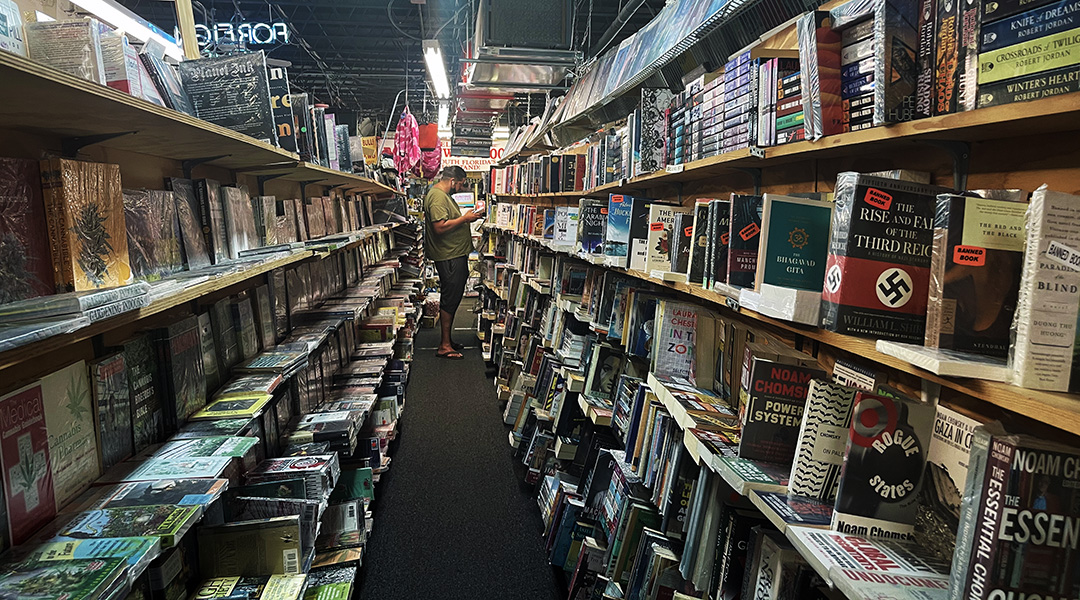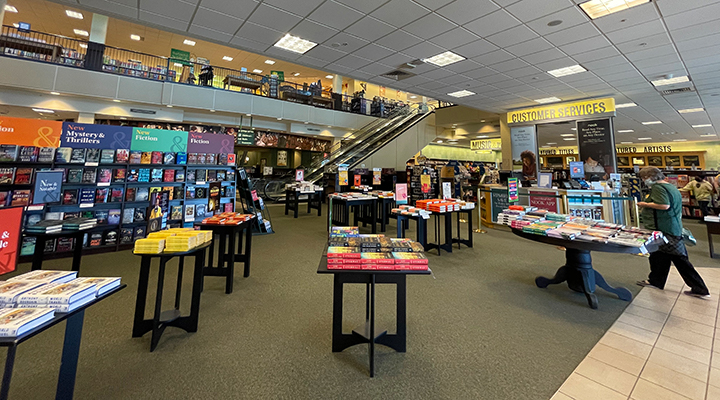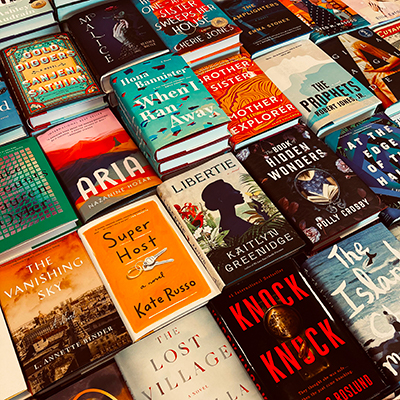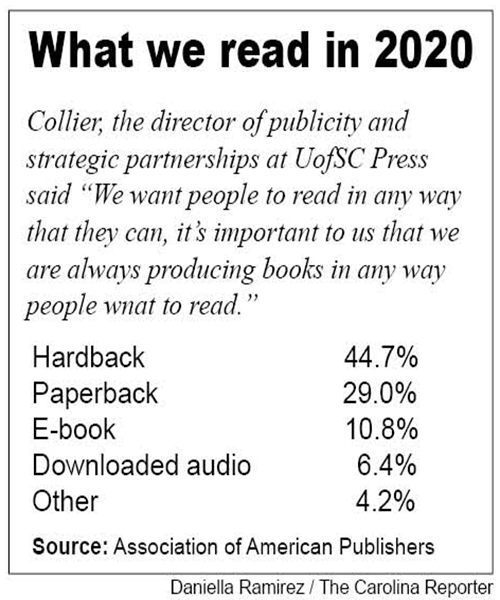Patrons continue to visit local bookstores in hopes of finding their favorite books in Fort Lauderdale, Florida. Photo by: Anizia Fulmore.
As the pandemic required more people to work and spend time at home, many found that immersing themselves in a different world through books was a helpful distraction.
“We saw a real uptick in book sales during the pandemic. We saw about an 8.2% rise in print sales alone,” MacKenzie Collier, director of publicity and strategic partnerships at UofSC Press, said. “So I think that told all of us that people really need and want books.”
Collier said that, year after year, people have talked about the demise of books — including at the start of the pandemic — but sales numbers say otherwise.
Book sales have been performing well, propelled partly by the success of Amazon and non-traditional book retailers. Sales at brick-and-mortar bookstores were down by almost a third through September, according to a COVID-19 and Book Publishing: Impacts and Insights for 2021 study.
According to Collier, during the pandemic, university presses such as UofSC allowed academic libraries to access all of their books at no charge.
“We will continue to do that, both on a library-by-library basis and through a network of South Carolina libraries, now and into the future.”
Bookstores as neighborhoods
Collier said most booksellers really want people to come in and talk about the books they like and continue to have these conversations.
“Thank goodness for the internet and that we can do a lot of this online, but it’s not the same thing as touching and feeling books and being inside a bookstore,” she said.
With consumer spending anticipated to grow in 2021, book sales, in particular, may begin to grow according to the COVID-19 and Book Publishing study.
Collier said most bookstores are members of trade organizations such as SIBA, the Southern Independent Booksellers Alliance. These groups have helped bookstores pivot to more online sales during the pandemic.
Websites such as bookshop.org, which launched in early 2020, are an alternative to behemoths like Amazon. Independent booksellers can get a small percentage of sales made through this site.
“Amazon and Barnes and Noble, who were already selling books online, continue to sell a lot of books online,” Collier said.
She said academic publishers such as UofSC press and popular book publishers such as Penguin Random House have benefited from growing their online presence, be-it through a website, or social media. Their goal is to make books viable to customers through a variety of different channels.
Erin Steinberg, the owner of Bob’s News and Book store in Fort Lauderdale, Florida, continues to see his regular customers and newcomers enjoying the scent of new and used books on the aisles.
“I wouldn’t say we’re selling 500 books a day anymore, but 50-100 is the average number now. People love the feeling of a book in their hand, to turn the pages,” he said.
Bob’s News and Book store’s main sellers are books, but it also sells magazines, comics, audiobooks, and DVDs. Physical novels are still in demand, as customers continue to shop at local bookstores, however it is harder to order products for the store.
“I used to be able to buy five or six copies in bulk, but with the pandemic, I can only order one to two copies, and it’s hard on business,” Steinberg said.
Public libraries are a lifeline
Some public libraries around the country closed due to the pandemic, but still offered curbside service and online help. In Fort Lauderdale, libraries stayed open and continue to welcome guests and new patrons who want to visit and find new books.
Allison Grubbs, the interim director of the library division for Broward County, has noticed an increase in audiobooks and e-books, especially sold on Amazon.
The American Association of Publishers reported that downloaded audio remains “the fastest-growing digital revenue segment,” and in 2015-2019, it grew by 143.8%.
“A lot of authors are going the self-publishing route because it’s becoming easier,” Grubbs said.
Due to the pandemic, public libraries faced budget cuts from the state, causing a shift in the library dynamic. Libraries were able to use sites like OverDrive, a free service that allows library cardholders to borrow ebooks and audiobooks from libraries through their mobile devices to continue to serve their patrons.
“We did not face too many budget cuts, but it is important to ask for help. Supplemental funding through grants or fundraising can help to plug some holes, which are usually short-term but can help us through this tough time,” she said.
In South Carolina, Collier said the Richland County Public Library did a big fundraising campaign to install hot spots for people to download books through their apps.
“It’s about making sure people can access their books even when libraries are closed,” Collier said.
With the lockdown lifted and increased vaccines, the social imperative for reading could decline, but professionals believe that it may stay the same.
“I think people are going to continue to read at a steady rate, and it will only increase from here,” Grubbs, the Florida interim director of libraries, said.
In the next five years, sales for e-books are projected to increase as well as virtual publishing. Book publishing and libraries will continue to change and look different in the near future as well.
“Consumer-friendly advocates are being appointed to administration and libraries are starting to advocate more for themselves in a more public sphere,” Grubbs said.
Hardcover and paperback novels are still very popular, causing bookstores to buy more in bulk, despite the increased sale of ebooks. Photo by: Daniella Ramirez.
The Del Webb Library in Indian Land, South Carolina, is open to accept book donations and will soon be scheduling book sales, speakers and library programs. Photo by: Daniella Ramirez






